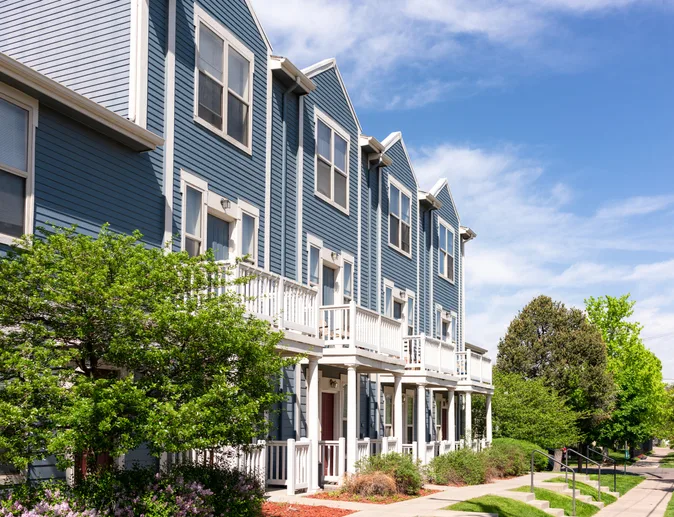Both renting and buying a home each have their pros and cons. Before choosing your next home, it’s worth weighing up the two options. Below is a guide to the advantages of each one.

Why rent a home?
Most people start by renting a home. There are a few benefits to renting a home instead of buying one.
No huge down payment
The biggest reason that people choose renting over buying is that it’s a lot cheaper upfront. While landlords often charge a deposit upfront (which is often around a month’s rent), this is nothing compared to the huge down payments that are charged by mortgage lenders when buying a home. The average first-time-buyer down payment in America right now is 6% – on a $300,000 property, which means you’ll need to save up $18,000. A rental deposit on a home is usually $1000 to $2000.
Access to more locations
Renting gives you more flexibility as to where you want to live if you’re on a budget. Consider the fact that the average San Francisco property is priced at $1.3 million – which would require you to save up a 6% down payment of $78,000. Most people are never going to be able to save up this amount of money on a modest income, but saving up a $2000 rental deposit is achievable. If you want to pursue a job in a city, let’s say McKinney Texas, you may find that renting is the only reasonable way to access the market (unless you’ve already built up equity from a previous property). Living in one of these apartments for rent in McKinney not only gives you access to more locations but also endless important amenities that will make your life easier.
Moreover, if you’re considering a move to a more affordable city, like St. Louis, your budget can stretch even further, providing you with more housing options and a higher quality of life. You may also want to explore unique housing options like lofts, which offer a blend of modern aesthetics and open layouts. To find a variety of available apartments and lofts in St. Louis, visit this website that specializes in listing diverse rental properties to suit your preferences and budget. This way, you can discover the perfect place to call home without compromising on your financial goals or lifestyle preferences.
Reduced maintenance costs
When you rent property, you don’t have to worry about paying for repairs that are a result of wear and tear. If a pipe bursts and floods your home, your landlord has to pay the bill for fixing it and clearing the place up. While monthly rental costs may be more expensive than monthly mortgage rates, you could still save money by not having to make frequent repairs. It’s worth noting that landlords are usually responsible for repairs as a result of natural disasters or crime too, although it’s legal for landlords to specify that they aren’t liable for this (always read your contract!).
An ideal short-term option
Renting is an ideal short-term living option. Not only do you not have to save up a big down payment when renting, but you can also move in more quickly than when buying due to much less admin. Applying for a mortgage and purchasing a home can take several months, while it’s possible to secure somewhere to rent in a month or less. You’re also not tied into renting a home for a long period like you are with buying. You usually have to live in a home a couple of years before selling is a viable option so that you build equity and afford the selling costs – in comparison, many rental properties offer minimum terms of a year, while some even offer six-month terms.
Having this flexibility is great if you’re considering a life in another location, or if you’re not sure whether you want to stay in your current city for the long-term. People are always researching houses for rent when they’re anticipating a change of circumstances. For example, if you’re thinking about changing jobs soon, you may prefer to rent until you find out how the new job pans out. Moreover, if you’re considering a move to a more affordable city, like St. Louis, your budget can stretch even further, providing you with more housing options and a higher quality of life.

Why buy a home?
Buying a home is becoming a lot less popular due to rising property costs, but it still has many clear benefits that are worth considering. Some of these advantages include:
Increased freedom to renovate your home
When you rent a home, your landlord usually won’t let you make any renovations. In fact, some landlords won’t even allow you to hammer a nail in the wall without asking for permission first. When buying, you don’t have to worry about such strict restrictions. While certain renovations may still need to be approved by a local zoning board, you still have the freedom to pretty much transform the interior of your home. You can paint walls any color you like, lay new flooring, add new bathroom fixtures or replace kitchen countertops without having to ask anyone for permission. This could allow you to truly create the home of your dreams. You could also add value to your home.
Access to equity and collateral
One of the biggest advantages of buying a home is the ability to build equity and access collateral. Rent is often described as ‘dead money’ because you never get it back. With a mortgage, you’re helping to build equity that you can get back if you ever decide to sell your home. If the value of your home goes up, you may even make a sizable return when selling your home on top of getting back your entire mortgage. You can also use your home as collateral when taking out a loan (this allows you to borrow money up to the value of your home). Non-recourse loans using your home as collateral could be used to pay for anything from a new car to a wedding to renovations to even your retirement fund – this guide explains exactly how to use non-recourse loans with self-directed retirement accounts. When renting, you don’t have any collateral to borrow with because you don’t own your home, limiting your options when it comes to larger loans.
Freedom to rent out space
You can also make money out of your home by renting out space. Some homeowners rent out a room to a lodger to help pay the mortgage. You can also rent out or sell off any spare land you have (some people even rent their driveways out as paid parking spaces or sell off sections of their backyard). This is something you can’t usually do when renting – while some landlords allow tenants to sublet, the majority do not allow this.
An ideal long-term option
Buying a home is a much better long-term investment – the longer you stick around, the more likely you are to make a return when you eventually sell. You can also spend time and money renovating your home to make it completely yours, which you can’t do quite as freely when renting. If you’re ready to settle down, saving up money to buy somewhere may be a good idea. Getting on the property ladder is tough, but once you’re on it, you can start investing money into your future via mortgage payments and renovations.

Jessi is the creative mind behind The Coffee Mom, a popular blog that combines parenting advice, travel tips, and a love for all things Disney. As a trusted Disney influencer and passionate storyteller, Jessi’s authentic insights and relatable content resonate with readers worldwide.
